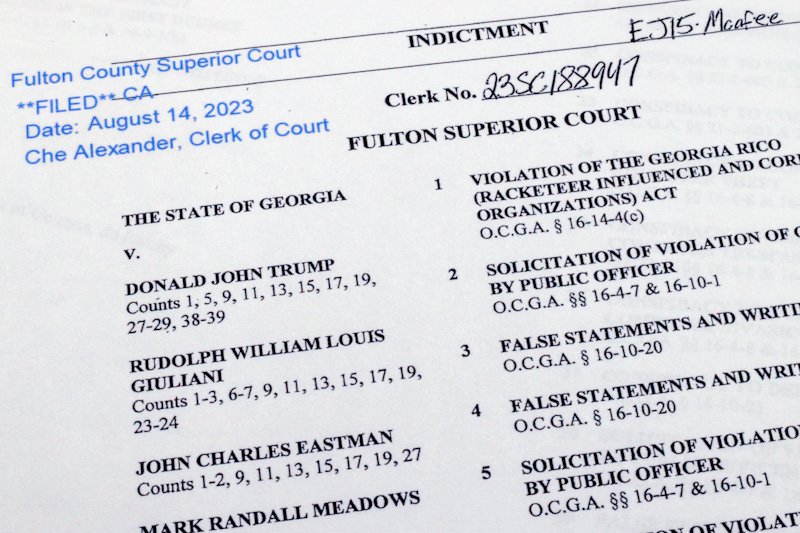These lawyers are charged along with Trump in Georgia RICO indictment; is 'partisan shift' to blame?

The indictment in Georgia against former President Donald Trump is displayed Aug. 14. Trump and several allies have been indicted in Georgia over efforts to overturn his 2020 election loss in the state. The criminal case announced Monday is the fourth brought against the ex-president in a matter of months. Photo by Jon Elswick/The Associated Press.
The Georgia racketeering indictment against former President Donald Trump on Monday charges 18 other people, including eight lawyers.
The indictment alleges that the 19 defendants violated Georgia’s Racketeer Influenced and Corrupt Organizations Act through their efforts to overturn the results of the 2020 presidential election. The indictment lists 41 charges.
The defendants face differing counts—Trump faces 13 charges—except all the defendants are charged with participating in the RICO “criminal enterprise.”
The Washington Post and the New York Times are among the publications with stories.
Among those charged in the conspiracy are Trump lawyer Rudy Giuliani and former Chapman University law professor John Eastman.
In an op-ed for the New York Times published before the Georgia indictment was released, Deborah Pearlstein, a professor at Yeshiva University’s Benjamin N. Cardozo School of Law, said lawyers’ alleged involvement in election fraud “speaks to a troubling crisis in the legal profession.”
At the time of the Watergate scandal, 29 lawyers faced sanctions for failing to stop misconduct by former President Richard Nixon and lying to facilitate it. The ABA responded, she said, revising its Model Rules of Professional Conduct to make clear that lawyers who work in government or any other organization have a duty to report unlawful acts. The ABA also required students at accredited law schools to take a professional responsibility course, Pearlstein said.
Since then, Pearlstein said, there has been a “partisan shift.” The ABA represents a lower percentage of lawyers today, and its influence has been partly supplanted by legal groups based on partisan alliances, such as the Federalist Society, she said.
In this environment, she said, it is not hard to see why lawyers “might have come to believe that their best path to career success was to elevate partisan loyalty over professional ethics.”
The Georgia indictment lists eight ways in which the defendants tried to overturn the 2020 election, according to the New York Times. They are:
- Lying to the Georgia legislature
- Lying to Georgia officials
- Creating fake documents supporting fake Trump electors
- Harassing an election worker
- Soliciting Department of Justice officials to make fake claims about the Georgia election
- Pressuring then-Vice President Mike Pence to reject electoral college votes
- Breaching voting machines to steal data
- Engaging in a cover-up
The Aug. 14 indictment is here; an annotated version is here.
Five lawyers charged in the Georgia indictment mirror the description of five uncharged co-conspirators in special counsel Jack Smith’s indictment of Trump alleging a conspiracy to defraud the United States through fake election-fraud claims.
Those lawyers and their alleged wrongdoing are:
- Giuliani, accused of making false election claims, pressuring state officials and pushing for fake electors. The New York Times said it is ironic that Giuliani is charged in the RICO indictment because he used the federal RICO statute to charge organized crime families when he was a U.S. attorney in New York.
- Eastman, who wrote a memo on a “Jan. 6 scenario” and allegedly filed a lawsuit with false statements about election fraud.
- Trump lawyer Sidney Powell, who claimed that voting machines had been hacked and hired a company to examine election equipment that was later breached.
- DOJ official Jeffrey Clark, accused of falsely stating in a memo that the DOJ had “identified significant concerns” that affected the election outcome in multiple states.
- Appellate attorney Kenneth Chesebro, accused of writing memos on fake electors and electoral votes and developing a strategy to disrupt the counting of electoral votes on Jan. 6, 2021.
Other lawyers who are charged are:
- Jenna Ellis, who is accused of pushing for fake electors and advancing a strategy to disrupt and delay the electoral vote count Jan. 6, 2021.
- Robert Cheeley, accused of working with Eastman in pushing for fake electors and making false statements about election fraud.
- Ray Smith III, accused of soliciting fake electors and making false statements about election fraud.
See also:
ABAJournal.com: “Georgia indictment bolstered by broad state law on racketeering”
Write a letter to the editor, share a story tip or update, or report an error.



